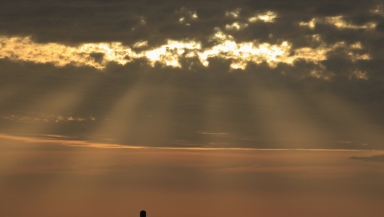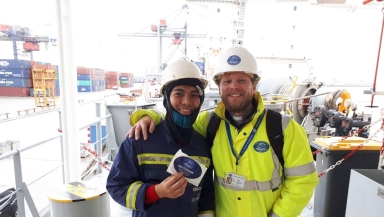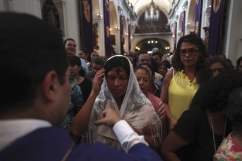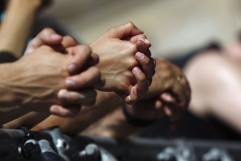
As we begin the season of Lent, our minds might be on fasting. I grew up in an Anglo-Catholic vicarage and Lent was a time of real hunger. I developed the discipline that made me an anorexic in later life, and would regularly go whole days with no food, especially Fridays. It gave me a sense of power in what felt like a pretty chaotic existence. Easter Sunday was in our family a binge of chocolate as we made up for the previous 40 days of deprivation.
Yesterday, our local Tesco, having run out of chocolate reindeers shortly after Christmas, finally got in the chocolate bunnies. I've been watching the shelves for the great occasion. Today, as I go home to eat my first chocolate bunny, of Lent, I regret the loss of the fasting discipline. I've tried many times to rediscover it, but it always ends in humiliating failure. If I can't resist this temptation, can I resist any temptation? Am I weak, immoral, or just human?
I think one of the reasons I find giving up in Lent so hard to do is because many years ago, I gave up alcohol. I've not had a drink since that May, many 'day-at-a-times' ago. That major bit of giving up though was not just for Christmas, or Easter, or to lose a few pounds for the summer. It was for life itself. I chose life, not death.
All my childhood, growing up in the vicarage and abroad with our father, who was briefly with a missionary organisation, I had said the Lord's Prayer every day. I had prided myself on a good memory. One day I stood very drunk at the top of that mountain, the devil himself crawling out of the walls and laughing at me. I saw the demons in the abyss tempting me in. Die, die, die they said. In terror, I tried to pray the Lord's Prayer. I couldn't remember it. I never had full-blown delirium tremens. But not for nothing do they call it the 'demon drink'.
I was now at the bottom of the abyss. That was when I understood for the first time what I had to do. I still could not remember the words, but with all my heart and soul, I asked God for help. I cannot tell you whether it was God that spoke to me next, or a rare voice of sanity that made itself heard in my own head. An answer did come though of what to do next. It said: 'Call the Samaritans.' I did, they told me what to do. I did it, and a day at a time, I've been sober ever since. Today, when I come to the rail for communion, I don't take the wine, only the bread. Giving up alcohol was nothing to do with self-control and everything to do with surrender.

In my new life, the aim of my existence is to stay well spiritually, mentally and physically. I do this for God, myself and my family. It is achieved in a number of ways - chiefly prayer, meditation and giving back to the people who helped me. But I must confess, chocolate is an aid. I won't get in a car and kill someone through too much chocolate. I won't go mad or get very, very sick. But every Lent, I will feel just that little bit guilty. It's like Augustine's famous prayer: Lord make me chaste, but not just yet. Lord, help me to give up chocolate for Lent. But not yet.
This week, Lent groups in our church are starting on the booklet, All Is Gift. Our aim is to be more aware that everything we are and have is a gift from God. We will try to cultivate an 'attitude of gratitude'. This attitude of gratitude is one of the main sayings of the groups I go to now to help with my recovery. Another way of putting it is, the bottle is half full, not half empty.
For the Church, they could think: our churches are half full, not half empty. God's gifts to us are the essence of the daily miracle we live in. An attitude of gratitude helps make this miracle possible. Witnessing to these gifts might consist of nothing more than seeing life from the bottle as half full rather than half empty, obviously half full of water in my case.
















